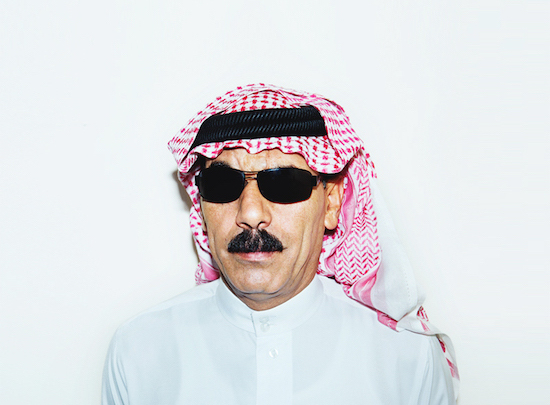Few careers have quite panned out in the way that Omar Souleyman’s has. Back in May this website ran a deliberately contentious but nonetheless inspired compilation piece called ‘I Prefer Their Later Work’, in which Quietus writers bucked against the music pseud’s firmly held belief that early, less commercial material is invariably better, and instead chose latter-day albums to cherish. Former Syrian wedding singer Souleyman wasn’t on that list, but his music has developed and reached out to a wider, more appreciative audience in such a phenomenal way in later life, I can think of no other artist who has followed a similar trajectory. Aside for a few people in Tell Tamer who stand by the early examples of his 500 live albums as the true authentic sound of dabke, Souleyman’s best years are considered to be his latter ones. (It would take some effort to track down the early stuff from a UK base, though I’m sure there are those who’ve tried).
Whether he sees it that way himself, having had to leave wartorn Ras al-Ayn and make a living elsewhere, is another matter. Certainly the success he’s experiencing now as a 50- or 51-year-old musician (the internet is unclear on his exact age) signed to Diplo’s Mad Decent label and continuing to sell out large venues to wildly appreciative audiences, must still be difficult to fathom. If there was a suspicion there was some misconceived irony at play regarding his late flourishing popularity in countries across Europe, any such suspicion must now be put to bed. He’s no longer a fad, and his popularity may yet grow further. Omar Souleyman is still a bourgeois hipster magnet, as the queue of chic thirtysomethings stretching along the Rue Boyer and up the hill of the 20th arrondissement at half past midnight is testament to. Certainly the chants of “Omar! Omar!” inside the building, and the clamour and cameraphones wherever he wanders, indicates something far more intense than irony.
The stage at the Bellevilloise is in the basement and set back into two walls with two facades making it more like a boxing ring than a traditional front-facing auditorium, a setup that suits Souleyman’s peripatetic way of working up a crowd. It’s just him, gesticulating and vocalising, his keyboard player behind him, and some of his pals stood at the back with their arms folded looking somewhere between bored and menacing. Their inertia is particularly stark juxtaposed against the frantic partying around the stage perimeter.
For a club night, the economy of sound works, and the trills from the simulated synths work in the most part too, though the swooping strings are a little too synthetic and clunky, to the point of distraction on occasion. And the keyboardist does have a habit of throwing in an incongruous blues scale now and again that can really jolt you out of your dance trance. Where, say, Islam Chipsy astonishes with his virtuosity, with Omar Souleyman it works better when it’s repetitive and cohesive, with unscripted musical moments coming off as chintzy and unwelcome. The call and response between Omar and the simulated buzuqs are a highlight; the cheap game-show flourishes the nadir. It’s not so much a case of keep it simple as keep it in context. It should be noted that these unwieldy moments are rare, and most of the time the music is nothing short of remarkable and hypnotic.
As to what tracks are played, I cannot, hand on heart, be absolutely certain. Like with Can, The Fall or Motörhead, it doesn’t really matter. There are seven or eight bangers in all, and from To Syria, With Love I recognise ‘Ya Boul Habari’ from its Jan Hammer-style interjections, and ‘Ya Bnayya’ from its alacritous percussion and slight quickening of pace. ‘Khayen’ – which sounds like somebody fingertapping with the bagpipes – may also get a runout. Towards the end of the set, ‘Wenu Wenu’ features a thrilling, clattering breakdown, while ‘Warni Warni’ and its simulated mizwad ululating to the edges of psychedelia is a treat to behold. With Omar Souleyman, Setlist.fm is never your friend.
The singer is due on at 1pm and due off at 1.50pm, but he takes to the stage 20 minutes early and leaves 20 minutes early too, nearly catching us out. The Bellevilloise is crepuscular, lit with a spotlight resembling a purple bruise, and yet Omar obligingly never removes his shades no matter how dark it gets. “Thank you, bye bye” are the words he departs with, and he disappears swiftly through the stage door as if fulfilling a contractual obligation. If he’s a man displaced geographically, then he could have worse surrogates than the stage, where he will always be welcome. The rest of Europe will be reminded of that fact when he goes on tour in January and February, and of the fact that To Syria, With Love is an artist at the peak of his powers, some 500 or so albums in.


